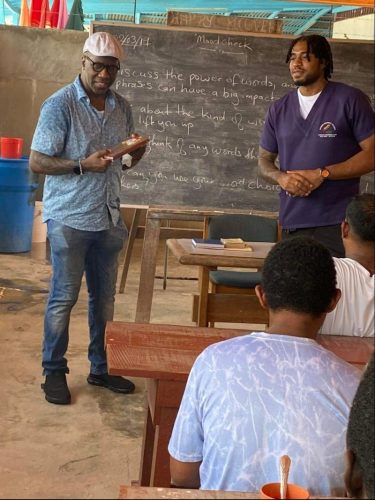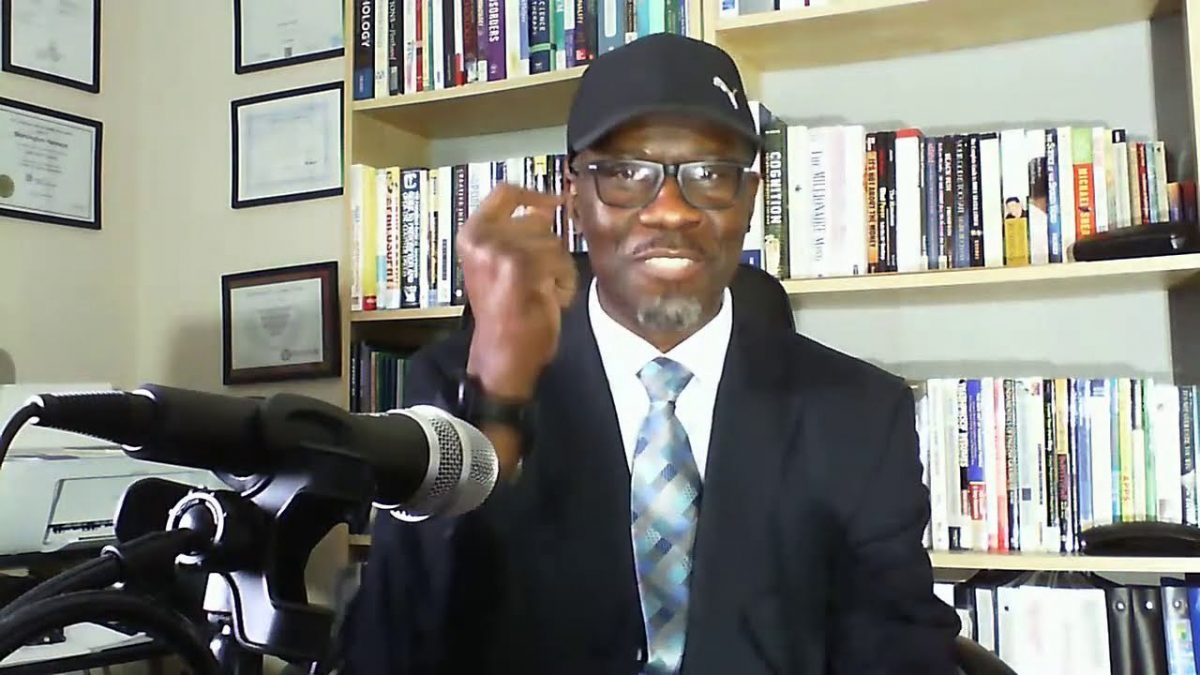The deaths of two of his beloved singers due to their addiction of drugs is what drove an adult Shirvington Hannays to become a clinical supervisor, addiction counsellor and TeleHealth mental health professional, but he took this route also when he was at the lowest point in his life and was on the verge of ending it.
“It was because of Whitney Houston and Amy Winehouse. I loved those two women so dearly; I think they were so talented… I was very perplexed and to the verge of being depressed that these two women, who to the world had all the resources, how they couldn’t get over this thing, manage this thing, survive whatever it was in terms of substances,” the Canada-based Guyanese related during an interview on a recent visit to Guyana.
Now 53, Hannays, who left Guyana about 30 years ago, is no stranger to the stage himself. Before he left Guyana, he was a well-known stage actor, appearing in plays at the Theatre Guild and the National Cultural Centre.

He loved their music and he wanted answers to the questions he had; the only thing he could do was to go to school. At that time, he was a programmer and it was very difficult to get work as a self-employed individual. A career change in his early forties did not seem far-fetched and he made a decision to pursue a diploma in addiction and community work.
“Boy oh boy was I in for a surprise! Lo and behold, I discovered in my family there were serious issues with alcoholism. Both my mother’s father and mother had serious alcohol issues; my grandfather was what we would call a functional alcoholic… [There were] many other things I had to confront. I realised that I lived, as a child, with someone who had schizophrenia and I had to go to Georgetown Hospital to take food for the individual. I was terrified of him and so it was not like new territory, but like ‘oh you are in your element sort of,’” Hannays said.
Then he faced a midlife crisis and had to confront issues of depression, anxiety, panic attacks “the whole works,” he said. As if that was not enough, he then became homeless.
“People would say, ‘you are homeless in Canada?’ Yes. But you see in Canada, once you don’t have a fixed place of abode that is your address that your mail is going to, you are technically homeless. …I never slept on the streets. I never ate out of a bin, that is vagrancy. But what I was doing, I was staying at this person for a couple of weeks, sleeping on their sofa or couch and we call that couch surfing and so I dealt with that,” he explained.
Fast forward
Those days are now long behind him. Hannays is a certified addiction counsellor and he has reached the pinnacle of where someone who specialises in addiction work can be, so he also has the designation of clinical supervisor and works with people who are entering the field to help to mould and shape their careers.
Over the years, he has been employed with several agencies but the one that shaped his career was the Salvation Army. He recalled that he did his internship at a homeless shelter while he was homeless and one day when it was more than him, he broke down and the organisation did everything to help him to get back on his feet. He felt a loyalty to the Salvation Army and has worked there in various capacities for an extended period.
“I learnt so much. I honed my craft. I got to develop a system of work using what we called a community reintegration programme which allows people who have substance abuse problems to work and then reintegrate them using a holistic approach to treatment,” he said. During that period he also discovered a lot about himself and what is really mental health against what is mental illness.
Hannays said he was eventually lured away from the Salvation Army and he found out that sometimes money is not everything as even though he had the title clinical director it was more a title, than having the power to make any big decision. Just before the COVID-19 pandemic, the facility was closed down.
But Hannays has now built an online clinic where he virtually touches base with clients and does entire programmes under what is known as the SMAHOO Change Clinic Spa Experience. His business has had its “ups and downs”, he said, but has survived. He has formed alliances with others and if he is unable to deal with an issue they will step in and assist.
He recalled that even as he worked in the technological world, his passion was always to really help people and while he had to be at his lowest to get where he is today, it was all worth it. He is now doing what he really loves.
He was quick to point out that he cannot fix the broken man or woman but rather supports them to see blind spots in their lives and to confront who they are in the stories they are telling themselves.
“That’s what I do as a mental health professional. During the pandemic, I have developed my own approach to working with people with suicidal thoughts, depression and substance use disorders…,” he explained.
Hannays knows what it is to access help as he recalls that he was taken figuratively, “kicking and screaming” to access needed assistance. At that point, life had become a struggle. He was in school and had walked out of his marriage for his own sanity; it was then he became homeless.
“It was one of the best things I think I did, but in hindsight I could have done it differently if I knew of the resources that I now know were available,” he said.
He was at his lowest one morning and believed he would have hurt himself so he reached out to a hotline and was directed to call an ambulance. He recalled that at that point he was not only hopeless, but he was isolated as he was not talking to anyone and had no emotional connection to anyone.
“What I want people to know, it is not that people truly want to die, whatever the pain might be that they think will never change they want that to go away…,” Hannays said.
For him the kicking and screaming part was taking medication, but he had to do so because there was a serious imbalance and even today if he does not take his medication he can tell when his mood is off and he can become very depressed.
Guyana
Hannays wants Guyanese to be able to access universal mental health care. He suggests that at least four times a year, people should be able to see a therapist or counsellor for 30 minutes and “do check in and tune up on your mental health”.
He pointed out the differences between mental health and mental illness, with the former being one’s inability to cope or manage how they respond to life experiences, and the latter having an illness that one has to be treated for.
Hannays said a lot of his family, including his mom, still live in Guyana so he makes regular visits and he has been doing some work here during those visits. In recent times he held a workshop at the Phoenix Recovery Project.
He now has plans to launch the Change Clinic in Guyana and while it will be online, it will be a secure portal for Guyanese. He wants it to be technically free for Guyanese with a one-time set up fee, but if the person is unable to pay he will take care of the cost or get an organisation to do so.
Hannays explained that following the one-time payment the individual will continue to have on demand care and four check-ins and tune outs during the year.
He is collaborating with Caribbean Voice organised by Anand Boodram on this initiative, which has a wide reach in the Caribbean. The same offer being made to Guyanese will also be made to people in the Caribbean. The reason for the one-time fee, Hannays said, is because there is a premium service that is going to be available to the rest of the world and he wants to be able to afford the resources to offer the same to Guyanese and other Caribbean nationals. He will also be able to pay other persons who would be on contract working along with him as he would not be able to do it on his own.
Today, apart from being where he wants to be professionally, Hannays has remarried and his personal life is also where he wants it to be.
“Grace is her name… [she] is really wonderful. We have a really good understanding, respect and that is more important than saying we have never had a problem,” he said of his wife.





